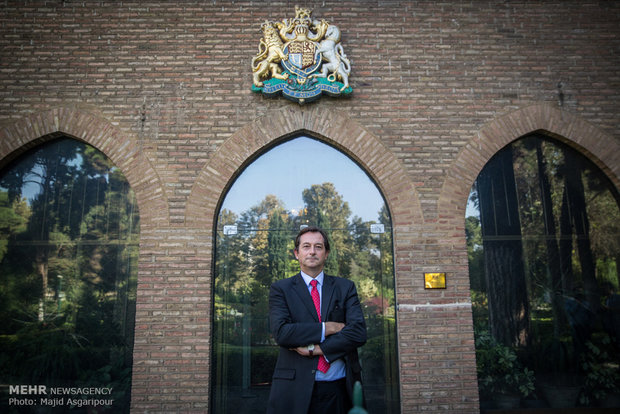Mr. Nicholas Hopton, is the UK ambassador to Tehran and last Thursday, Mehr News International Service correspondent Maryam Khormaei asked him about a host of issues including Britain’s regional aspirations as well as security order in the Middle East and the way Brexit would affect business especially the arms trade to the Persian Gulf states.
The UK Ambassador said that Brexit provides the opportunity for Iran to become an even more important as a partner in trade and economic relations for the British government, as the United Kingdom develops on building relationships with countries outside of the European Union.
British forces left the region in 1971. However, we see that after 40 years the UK starts building a new permanent military base in Bahrain. We know by experience that the presence of the foreign forces is likely to give the extremists enough motivation to grow and take roots in the region as a sort of violent reaction. How can you justify the paradox if you’re seeking to bring stability to the region?
You are right that at the invitation of the King of Bahrain, we are developing a naval base in the country. This is an important investment for the United Kingdom. An investment that is designed to try and support the peace and security of the region, not to destabilize it. I don’t agree with your assertion that foreign military presence always leads to fuelling extremism. I think sometimes that’s maybe the case. What the British government is seeking to do is to work with our partners to stabilize and bring peace to this region, a region which at the moment is very turbulent with a number of very difficult crises ongoing. I think it is very important that the international community should work together. Through such cooperative efforts my government hopes to be able to help stabilize, bring peace and security, and ultimately prosperity to the people of the Middle East.
Iran believes in a sustainable security order preserved by the regional states rather than the foreign powers. But the military presence of the UK and the western allies is to postpone the desired order of Iran. Why don’t the regional and foreign powers seek to build an internal order in the Middle East?
Well I think where regional powers and countries can successfully stabilize conflict and reduce it, the British government would be delighted to support these actions as best it can. It is much better if these issues can be resolved within a country or locally. Sadly, the world isn’t like that and it looks like conflicts particularly in Africa and the Middle East have not been stabilized by the regional forces. In these instances, it has required multilateral efforts particularly led by the United Nations to try and bring calm, peace and security; to solve these problems through political dialogue rather than violence. And in many cases, I can point particularly I think in Africa in recent years, these have succeeded. As your country and my country recognize, the United Nations has an important role to play and that is why coming back to Syria, we think that the efforts of Mr. de Mistura the United Nations’ Special Envoy for Syria require strong support from the international community - to move forward. Political dialogue and negotiation are the way to solve such issues. Syria has become a global not just regional problem. We have seen the migration flows into Europe of the displaced people, for example. This is an issue which affects us. Therefore, we feel that it is important we play our part with our partners in trying to bring a peaceful solution to Syria.

Do you think that Brexit will lead to more military armament cooperation between the Britain and the member states of the Persian Gulf Cooperation Council?
I don’t see a direct link between those two issues. I think Brexit is a new situation which the United Kingdom and the European Union are working through the implications of. I don’t see it affecting negatively in any way the relationship with Iran. I think, if anything, because the United Kingdom will become more focused on building relationships with countries outside of the European Union, Iran becomes even more important as a partner in trade and economic relations for the United Kingdom. And, I think likewise with other countries around the world, including countries such as the GCC. We already have strong relationships with the GCC countries. I think those relationships continue to develop and also become more important.
So, as there might be less monitoring on behalf of the European Union, is there any possibility that Brexit will lead to even more arms sales to the Persian Gulf Cooperation Council?
I don’t think that is the conclusion I would draw from Brexit. I think that there would be more trade probably overtime but already there is a huge amount of trade and the GCC countries are big investors in the United Kingdom in property, in business, in many ways. But I don’t see a direct link with arms exports.
Interview by Maryam Khormaei

























Your Comment